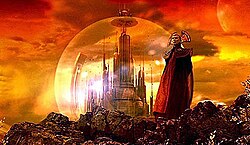
Back Gallifrey Catalan گالیفری CKB Gallifrey Czech Gallifrey Basque Gallifrey French גאליפריי HE Gallifrey Italian ギャリフレイ Japanese გალიფრეი Georgian 갈리프레이 Korean
| Gallifrey | |
|---|---|
| Whoniverse location | |
 The Citadel of the Time Lords on Gallifrey (from "The Sound of Drums")[1] | |
| Genre | Science fiction television |
| In-universe information | |
| Type | Planet |
| Race(s) | Gallifreyan/Time Lords[note 1] |
| Locations | Citadel, Panopticon, Arcadia, Academy, Death Zone, Eye of Harmony, Continent of Wild Endeavour, Mountains of Solace and Solitude, Mount Perdition, The Untempered Schism |
| Characters | The Doctor, the Master, Romana, the Rani, Susan Foreman, the Monk, Rassilon, The Valeyard, Omega, Drax, Professor Chronotis, K'anpo, Morbius, Borusa, the War Chief, The Inquisitor, Goth, the Other, The Eleven, K9 and Leela (The Invasion of Time) |
Gallifrey (/ˈɡælɪfreɪ/; sometimes, in the classic series, /ˈɡælɪfriː/), is a fictional planet in the long-running British science fiction television series Doctor Who. It is the original home world of the Time Lords, the civilisation to which the protagonist, the Doctor belongs. It is located in a binary star system[2] 250 million light years from Earth.[3]
It was first shown in The War Games (1969) during the Second Doctor's trial,[4] though it was not identified by name until The Time Warrior (1973–74).[5]
In the revived series (2005 onwards), Gallifrey was originally referred to as having been destroyed in the Time War, which was fought between the Time Lords and the Daleks. It was depicted in a flashback in "The Sound of Drums" (2007)[1] and appeared prominently in "The End of Time" (2009–10).[6] At the conclusion of "The Day of the Doctor" (2013), Gallifrey is revealed to have actually survived the Time War, though it was frozen in time and transported into a bubble universe,[7] before being unfrozen and arriving at the end of the universe at a chronological point before "Hell Bent" (2015).[8][9] By "Spyfall" (2020), it had been reduced to ruin by The Master who described the planet as hiding in its bubble universe again.[10] At the end of "The Timeless Children" (2020), one of the Doctor's allies, Ko Sharmus, detonates the "Death Particle" on Gallifrey, wiping out all organic life on the planet.
The points in time when Gallifrey appears are never definitively stated. As the planet is often reached by means of time travel, its relative present could conceivably exist almost anywhere in the Earth's past or future, as well as anywhere in the conceivable universe.[note 2]
- ^ a b Davies, Russell T (writer); Teague, Colin (director) (23 June 2007). "The Sound of Drums". Doctor Who. Series 3. Episode 12. BBC. BBC One.
- ^ Davies, Russell T (writer); Clark, Richard (director) (14 April 2007). "Gridlock". Doctor Who. Series 3. Episode 3. BBC. BBC One.
- ^ Jacobs, Matthew (writer); Sax, Geoffrey (director) (14 May 1996). Doctor Who. Fox.
- ^ Cite error: The named reference
war games tenwas invoked but never defined (see the help page). - ^ Cite error: The named reference
time warrior 2was invoked but never defined (see the help page). - ^ Davies, Russell T (writer); Lyn, Euros (director) (1 January 2010). "The End of Time". Doctor Who. BBC. BBC One.
- ^ Moffat, Steven (writer); Hurran, Nick (director) (23 November 2013). "The Day of the Doctor". Doctor Who. BBC. BBC One.
- ^ Cite error: The named reference
hell bentwas invoked but never defined (see the help page). - ^ Moffat, Steven (writer); Talalay, Rachel (director) (8 November 2014). "Death in Heaven". Doctor Who. Series 8. Episode 12. BBC. BBC One.
- ^ Chibnall, Chris (writer); Haven Jones, Lee (director) (5 January 2020). "Spyfall, Part Two". Doctor Who. Series 12. Episode 2. BBC. BBC One.
Cite error: There are <ref group=note> tags on this page, but the references will not show without a {{reflist|group=note}} template (see the help page).